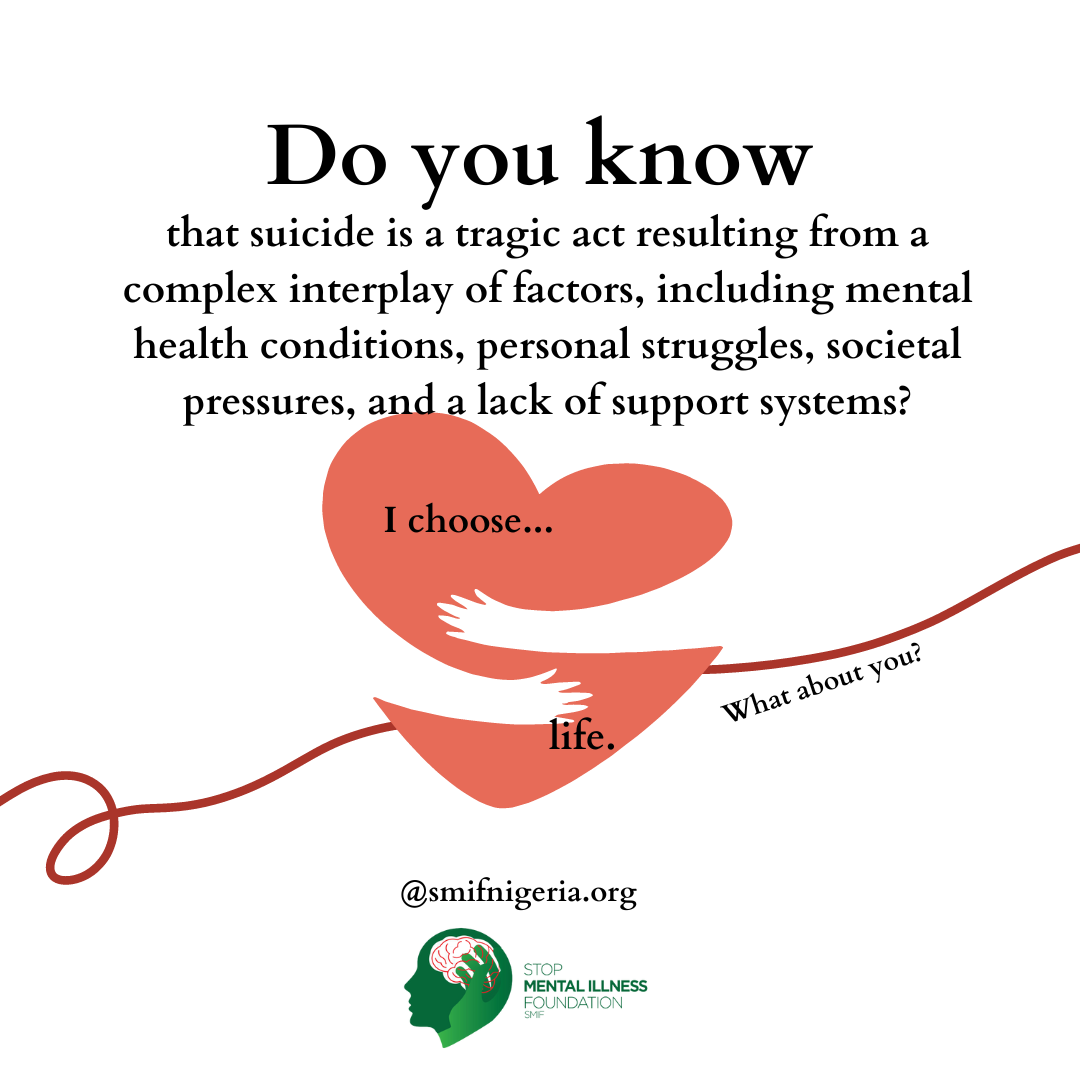
Understanding Suicide: Causes, Prevention, and Support
https://smifnigeria.org/suicidal-prevention/
Introduction:
Suicide is a deeply distressing and complex issue that affects individuals and communities worldwide. It is essential to shed light on this sensitive topic, dispel myths, and raise awareness about its causes, warning signs, preventive measures, and available support. In this article, we will explore the nature of suicide, its prevalence among young people, the role of parents in prevention, and what the Nigerian government can do to combat this pressing issue.
What is Suicide?
Suicide is the tragic act of intentionally taking one’s own life. It is often the result of a complex interplay of factors, including mental health conditions, personal struggles, societal pressures, and a lack of support systems. Understanding suicide requires a compassionate and non-judgmental approach, recognizing it as a multifaceted issue that demands our attention.
Causes of Suicide:
There is no single cause for suicide, as it is influenced by various interconnected factors. Mental health conditions, such as depression, anxiety, bipolar disorder, and substance abuse, play a significant role. Other contributing factors include social isolation, past trauma, relationship difficulties, financial problems, and a sense of hopelessness. It is crucial to address these underlying causes to prevent suicide effectively.
Suicidal thoughts, also known as suicidal ideation, are often experienced by individuals contemplating suicide. These thoughts can be overwhelming and are a clear indication that someone is in distress. Suicide contagion, on the other hand, refers to the phenomenon where exposure to suicide or suicidal behaviour influences others to consider or attempt suicide. Media representation and social media can play a role in perpetuating this contagion effect.
Suicide Prevention:
Preventing suicide requires a comprehensive and multi-faceted approach. Recognizing warning signs is crucial, including expressions of hopelessness, withdrawal from social activities, giving away possessions, sudden mood changes, and talking about death. Risk factors, such as previous suicide attempts, family history of suicide, and access to lethal means, must also be considered. Early intervention, destigmatization of mental health, and promoting help-seeking behaviour are vital preventive measures.
Help for Suicidal Behaviour and Thoughts:
If someone you know is displaying signs of suicidal behaviour or expressing suicidal thoughts, it is essential to take immediate action. Encourage open dialogue, listen non-judgmentally, and express your concern and support. Encourage them to seek professional help from mental health experts, such as therapists, psychologists, or psychiatrists. Crisis helplines and suicide prevention hotlines can provide immediate assistance and guidance.
Support for Suicidal Patients:
Supporting individuals who have survived a suicide attempt or are struggling with suicidal thoughts requires empathy and understanding. Encourage them to continue professional treatment and therapy, while also providing a safe and non-judgmental environment for them to express their feelings. Active listening, validation of their experiences, and regular check-ins can make a significant difference in their recovery.
Suicide Among Young People:
Suicide rates among young people are a pressing concern globally. Factors such as academic pressure, bullying, identity struggles, and social media influence contribute to their vulnerability. Parents, educators, and communities must prioritize mental health education, create supportive environments, and foster open conversations about emotions. Promoting resilience and providing accessible mental health resources are essential in preventing youth suicide.
Myths About Suicide:
Myths surrounding suicide perpetuate stigma. Myths about suicide can have detrimental effects on individuals who are experiencing suicidal thoughts and can hinder effective prevention efforts. It is essential to debunk these myths and promote accurate information to promote understanding and support for those who are struggling. Here are some common myths about suicide:
- Myth: People who talk about suicide are just seeking attention.
Fact: It is crucial to take any mention of suicide seriously. People who express suicidal thoughts or feelings may be reaching out for help, and dismissing their cries for assistance can have profound consequences. It is important to offer support and encourage them to seek professional help.
- Myth: People who attempt suicide are weak or selfish.
Fact: Suicide is not a sign of weakness or selfishness. It is often the result of overwhelming emotional pain and a feeling of hopelessness. Mental health conditions, such as depression, can contribute to suicidal thoughts and behaviours.
- Myth: Only individuals with a diagnosed mental illness are at risk of suicide.
Fact: While mental health conditions are a significant risk factor for suicide, not all individuals who attempt or die by suicide have a diagnosed mental illness. Other factors, such as relationship problems, financial difficulties, or traumatic life events, can also contribute to suicidal thoughts and behaviours.
- Myth: Once someone has decided to die by suicide, nothing can stop them.
Fact: This is a dangerous myth that can discourage intervention and support. Many individuals who survive suicide attempts often report feeling relieved that someone intervened and provided them with the help they needed. Timely intervention, support, and professional treatment can save lives.
- Myth: Talking about suicide may plant the idea in someone’s mind.
Fact: Openly discussing suicide does not plant the idea in someone’s mind. In fact, talking about suicide can provide an opportunity for individuals to express their feelings and seek help. It is important to approach the topic with empathy, listen non-judgmentally, and encourage professional assistance.
- Myth: People who are suicidal always show obvious warning signs.
Fact: While some individuals may exhibit noticeable warning signs, others may not show any outward signs of distress. It is crucial to be aware of behavioural changes, expressions of hopelessness, withdrawal from social activities, or sudden mood shifts. However, it is not always possible to predict suicide, so taking all expressions of distress seriously is important.
It is essential to promote accurate information, reduce stigma, and create supportive environments where individuals feel comfortable seeking help. If you or someone you know is struggling with suicidal thoughts, it is crucial to reach out to a mental health professional or a helpline in your country for immediate assistance.
